Marchés
Lors de la conception d’une intervention humanitaire et de la prise de décisions quant à l’utilisation des transferts monétaires, l’analyse générale des options de réponse doit inclure une analyse de marché. Il est prouvé qu’offrir un soutien ciblant le fonctionnement des marchés accélère la reprise et accroît la résilience dans les zones affectées par une catastrophe.
De nombreuses organisations ont investi dans la mise au point d’outils visant à faciliter l’analyse de marché et réfléchissent à la mise en place de programmes basés sur les marchés plus holistiques. Elles envisagent des interventions tirant profit du marché (basées notamment sur des transferts monétaires aux populations affectées), ainsi que des interventions soutenant directement les marchés (comme l’octroi de subventions conditionnelles aux vendeurs/euses pour la remise en condition du marché).
Initiatives associées
Contenu associé

1.2 Introduction à l’analyse de marché
Cours
Ce cours de 30 minutes offre une introduction à l’analyse de marché pour les contextes d’urgence. Il contient des contributions d'experts dans ce domaine. Ce cours a été développé en collaboration avec l'International Rescue Committee et le CALP Network et grâce au financement d’USAID/OFDA et de l’Agence Suisse pour le Développement et la Coopération. Il est destiné aux...

2.4 Un guide pratique pour l’analyse de marché
Cours
Ce cours en ligne de 3.5 heures vise à fournir aux équipes qui conduiront des analyses de marchés en contextes humanitaires une compréhension approfondie de la théorie et des étapes à suivre afin de leur permettre de comprendre le pourquoi et le comment du processus à suivre. Les participants seront guides à travers un scenario d'analyse de marchés d'urgence. Ce cours s'appuie sur...
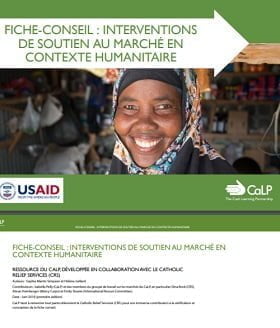
Fiche-Conseil : Interventions de soutien au marché en contexte humanitaire
Guides et outils
La fiche conseil définit le programme de soutien au marché en contexte humanitaire et le décrit dans la pratique. Elle permet aux praticiens humanitaires d’envisager systématiquement des interventions de soutien au marché, parallèlement à d’autres activités du programme. Le champ d’application comprend des interventions de soutien au marché axées sur l’offre/la disponibilité...
Thematic lead
Latest

Multisectoral Basic Needs and Market Assessment Moyo Uganda
Report
A multisectoral basic needs and market assessment done in Palorinya settlement and the host communities within Moyo district. Focuses are on basic needs and cash feasibility, the education system gaps, the firewood issues and access to loans and credit.
Data were gathered in December 2017, with...

Delivery Mechanism Mapping for Cash Based Interventions in Cox’s Bazaar Bangladesh
Report
The ‘Delivery Mechanism Mapping for Cash Based Interventions (CBI) in Cox’s Bazaar, Bangladesh’ was conducted in December 2017 by a ‘Cash Champion’ deployed from Catholic Relief Services (CRS) with the support of the Global Shelter Cluster and ECHO, and involved consultations with numerous...

The Role of Financial Services in Humanitarian Crises
Guidelines and Tools
More than 75 percent of adults who live in countries that are coping with humanitarian crises remain outside the formal financial system. Financial inclusion would provide both refugees and residents with a diversified set of financial products (including savings, remittances, credit, and insurance) that...

Tracking Expenditure on Cash Transfer Programming
Guidelines and Tools
The need for reliable and comparable data on Cash Transfer Programmes (CTPs), collected systematically and based on standardized markers and definitions, is widely recognised. Improved CTP tracking and reporting is essential for monitoring progress towards the commitments made to strengthen the scale and...
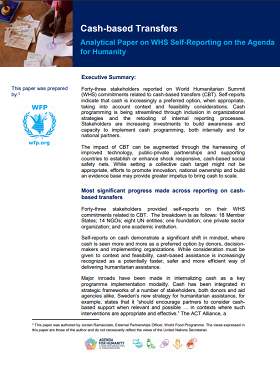
Cash-based transfers. Analytical Paper on WHS Self-Reporting on the Agenda for Humanity
Report
Forty-three stakeholders reported on World Humanitarian Summit (WHS) commitments related to cash-based transfers (CBT). Self-reports indicate that cash is increasingly a preferred option, when appropriate, taking into account context and feasibility considerations. Cash programming is being streamlined...

Building on social protection systems for effective disaster response: the Pakistan experience
Report
How can social protection systems be used in disasters, as a complement to, or substitute for, humanitarian assistance? Oxford Policy Management (OPM) led a two-year research project investigating this question, looking at the role of social protection in both mitigating the impact of large-scale shocks...
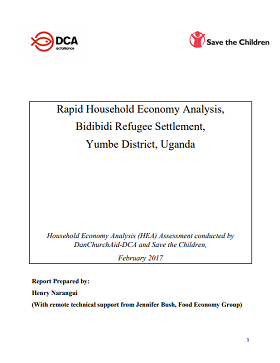
Rapid Household Economy Analysis,Bidibidi Refugee Settlement,Yumbe District, Uganda
Report
Yumbe District (Bidibidi settlement) hosts about 272,2061 refugees from South Sudan. An influx of refugees to Bidibidi settlement, Yumbe District, took place starting from August 2016 due to the increased conflict, scarcity of food, and subsequent financial instability caused by hyperinflation in South...

Can Conditional Cash Transfers improve the uptake of nutrition interventions and household food security? Evidence from Odisha’s Mamata scheme
Report
There is considerable global evidence on the effectiveness of cash transfers in improving health and nutrition outcomes; however, the evidence from South Asia, particularly India, is limited. In the context of India where more than a third of children are undernourished, and where there is considerable...
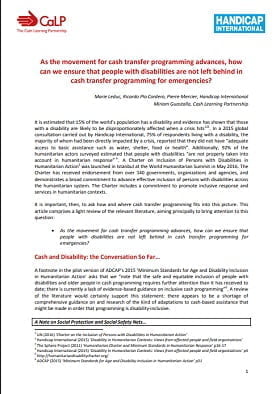
As the movement for cash transfer programming advances, how can we ensure that people with disabilities are not left behind in cash transfer programming for emergencies?
Report
It is estimated that 15% of the world’s population has a disability and evidence has shown that those with a disability are likely to be disproportionately affected when a crisis hits. In a 2015 global consultation carried out by Handicap International, 75% of respondents living with a disability, the...
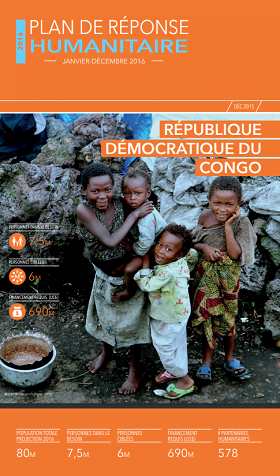
2016 Plan De Reponse Humanitaire
Rapport
L’analyse de la crise, menée par la communauté humanitaire à travers tout le pays, a permis de dégager ses principaux moteurs ainsi que ses manifestations les plus importantes :
• L’Ouest du pays n’est pas épargné.
Bien que l’Est de la RDC demeure la partie du pays la plus frappée par la...
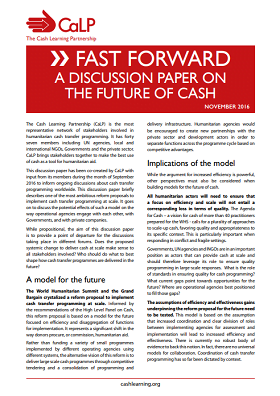
Fast Forward. A discussion paper on the future of cash
Report
This discussion paper has been co-created by the CALP Network with input from its members during the month of September 2016 to inform ongoing discussions about cash transfer programming worldwide. This discussion paper briefly describes one of the most ambitious reform proposals to implement cash...

Field manual for humanitarian e-voucher programs in Turkey
Guidelines and Tools
Welthungerhilfe has been active using e-vouchers in response to the Syrian refugee crisis since 2014, and has provided more than 100,000 individuals with unconditional cash transfers funded by the Federal German Foreign Office, ECHO, the European Commission’s Humanitarian Aid Office, and UNICEF....

10 things you should know about cash transfers
Blog Post
Watch the video here. Nearly 90 million people around the world are in need of humanitarian aid. One great way to help them is by giving people cash instead of goods like food and clothes. It’s simple, and helps more people, more effectively. Interested? Here are 10 things you should know about cash...

10 things you should know about cash transfers
Video
Watch the video here. Nearly 90 million people around the world are in need of humanitarian aid. One great way to help them is by giving people cash instead of goods like food and clothes. It’s simple, and helps more people, more effectively. Interested? Here are 10 things you should know about cash...

Food or Cash or Vouchers? New report on U.S. food assistance monitoring and evaluation suggests “All of the above”
Blog Post
In this special blog Jenny Coneff, the CALP Network's North America Focal Point, reflects on the main findings of the GAO report.
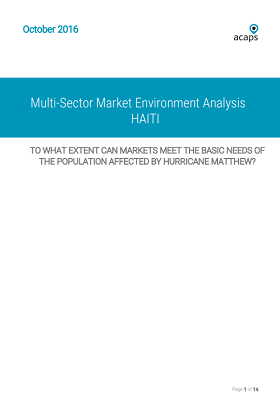
Multi-Sector Market Environment Analysis – Haiti. To what extent can markets meet the basic needs of the population affected by Hurricane Matthew
Report
Relief interventions in Haiti, including those to the 2010 earthquake, have been criticised for their (potential) harmful effect on the national market systems (ALNAP 2011 Humanitarian Coalition 2012). This multi-sector report intends to strengthen the understanding of the market environment in the...
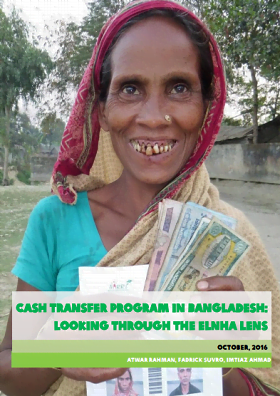
Cash Transfer Program In Bangladesh: Looking Through The ELNHA Lens
Report
Oxfam is implementing a multi-country humanitarian capacity building project titled as ‘’Empowering Local and National Humanitarian Actors (ELNHA)’’ in Bangladesh. This project is designed to use a variety of approaches that will enable local and national humanitarian actors (LNHAs) to take the...
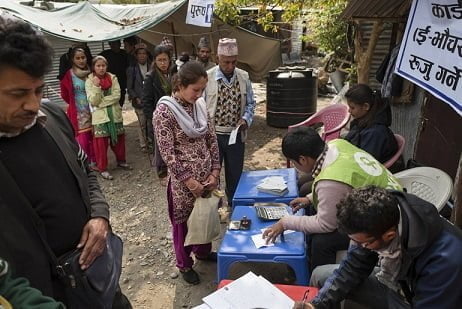
Cash is the answer to change the global aid system
Blog Post
A variety of studies show that recipients of cash not only use the assistance to meet immediate needs (food, shelter, health, schooling) but they also use it to invest in businesses. Cash is not only a dignified way of helping people in need get back on their feet, it incentivises and supports...

Gender Analysis for MVAC Emergency Cash Transfer Programme
Report
Cash Transfers (CTs) provided an effective means of supporting men and women to meet their basic needs in an emergency. CTs assisted men and women to meet their practical needs, giving men a sense of purpose as a provider, and allowing women to fulfil their traditional roles as wife and mother. CTs led...
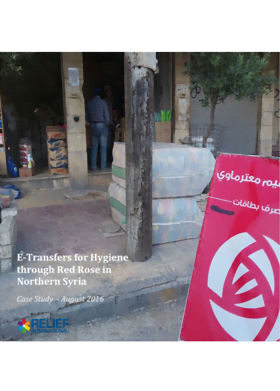
E-Transfers for Hygiene through Red Rose in Northern Syria
Report
Cash is receiving a lot of attention globally and is currently being scaled-up at the highest level. On the 9th February 2016, the UN Secretary-General Ban Ki-moon launched his report for the World Humanitarian Summit, calling for cash-based programming to be the ‘default method of support for affected...
